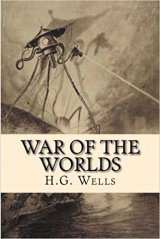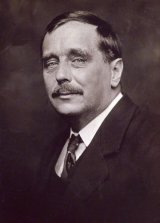The War of the Worlds Page #11
The War of the Worlds is a science fiction novel by English author H. G. Wells first serialised in 1897 by Pearson's Magazine in the UK and by Cosmopolitan magazine in the US.
My wife was curiously silent throughout the drive, and seemed oppressed with forebodings of evil. I talked to her reassuringly, pointing out that the Martians were tied to the Pit by sheer heaviness, and at the utmost could but crawl a little out of it; but she answered only in monosyllables. Had it not been for my promise to the innkeeper, she would, I think, have urged me to stay in Leatherhead that night. Would that I had! Her face, I remember, was very white as we parted. For my own part, I had been feverishly excited all day. Something very like the war fever that occasionally runs through a civilised community had got into my blood, and in my heart I was not so very sorry that I had to return to Maybury that night. I was even afraid that that last fusillade I had heard might mean the extermination of our invaders from Mars. I can best express my state of mind by saying that I wanted to be in at the death. It was nearly eleven when I started to return. The night was unexpectedly dark; to me, walking out of the lighted passage of my cousins' house, it seemed indeed black, and it was as hot and close as the day. Overhead the clouds were driving fast, albeit not a breath stirred the shrubs about us. My cousins' man lit both lamps. Happily, I knew the road intimately. My wife stood in the light of the doorway, and watched me until I jumped up into the dog cart. Then abruptly she turned and went in, leaving my cousins side by side wishing me good hap. I was a little depressed at first with the contagion of my wife's fears, but very soon my thoughts reverted to the Martians. At that time I was absolutely in the dark as to the course of the evening's fighting. I did not know even the circumstances that had precipitated the conflict. As I came through Ockham (for that was the way I returned, and not through Send and Old Woking) I saw along the western horizon a blood-red glow, which as I drew nearer, crept slowly up the sky. The driving clouds of the gathering thunderstorm mingled there with masses of black and red smoke. Ripley Street was deserted, and except for a lighted window or so the village showed not a sign of life; but I narrowly escaped an accident at the corner of the road to Pyrford, where a knot of people stood with their backs to me. They said nothing to me as I passed. I do not know what they knew of the things happening beyond the hill, nor do I know if the silent houses I passed on my way were sleeping securely, or deserted and empty, or harassed and watching against the terror of the night. From Ripley until I came through Pyrford I was in the valley of the Wey, and the red glare was hidden from me. As I ascended the little hill beyond Pyrford Church the glare came into view again, and the trees about me shivered with the first intimation of the storm that was upon me. Then I heard midnight pealing out from Pyrford Church behind me, and then came the silhouette of Maybury Hill, with its tree-tops and roofs black and sharp against the red. Even as I beheld this a lurid green glare lit the road about me and showed the distant woods towards Addlestone. I felt a tug at the reins. I saw that the driving clouds had been pierced as it were by a thread of green fire, suddenly lighting their confusion and falling into the field to my left. It was the third falling star! Close on its apparition, and blindingly violet by contrast, danced out the first lightning of the gathering storm, and the thunder burst like a rocket overhead. The horse took the bit between his teeth and bolted. A moderate incline runs towards the foot of Maybury Hill, and down this we clattered. Once the lightning had begun, it went on in as rapid a succession of flashes as I have ever seen. The thunderclaps, treading one on the heels of another and with a strange crackling accompaniment, sounded more like the working of a gigantic electric machine than the usual detonating reverberations. The flickering light was blinding and confusing, and a thin hail smote gustily at my face as I drove down the slope. At first I regarded little but the road before me, and then abruptly my attention was arrested by something that was moving rapidly down the opposite slope of Maybury Hill. At first I took it for the wet roof of a house, but one flash following another showed it to be in swift rolling movement. It was an elusive vision--a moment of bewildering darkness, and then, in a flash like daylight, the red masses of the Orphanage near the crest of the hill, the green tops of the pine trees, and this problematical object came out clear and sharp and bright. And this Thing I saw! How can I describe it? A monstrous tripod, higher than many houses, striding over the young pine trees, and smashing them aside in its career; a walking engine of glittering metal, striding now across the heather; articulate ropes of steel dangling from it, and the clattering tumult of its passage mingling with the riot of the thunder. A flash, and it came out vividly, heeling over one way with two feet in the air, to vanish and reappear almost instantly as it seemed, with the next flash, a hundred yards nearer. Can you imagine a milking stool tilted and bowled violently along the ground? That was the impression those instant flashes gave. But instead of a milking stool imagine it a great body of machinery on a tripod stand. Then suddenly the trees in the pine wood ahead of me were parted, as brittle reeds are parted by a man thrusting through them; they were snapped off and driven headlong, and a second huge tripod appeared, rushing, as it seemed, headlong towards me. And I was galloping hard to meet it! At the sight of the second monster my nerve went altogether. Not stopping to look again, I wrenched the horse's head hard round to the right and in another moment the dog cart had heeled over upon the horse; the shafts smashed noisily, and I was flung sideways and fell heavily into a shallow pool of water. I crawled out almost immediately, and crouched, my feet still in the water, under a clump of furze. The horse lay motionless (his neck was broken, poor brute!) and by the lightning flashes I saw the black bulk of the overturned dog cart and the silhouette of the wheel still spinning slowly. In another moment the colossal mechanism went striding by me, and passed uphill towards Pyrford. Seen nearer, the Thing was incredibly strange, for it was no mere insensate machine driving on its way. Machine it was, with a ringing metallic pace, and long, flexible, glittering tentacles (one of which gripped a young pine tree) swinging and rattling about its strange body. It picked its road as it went striding along, and the brazen hood that surmounted it moved to and fro with the inevitable suggestion of a head looking about. Behind the main body was a huge mass of white metal like a gigantic fisherman's basket, and puffs of green smoke squirted out from the joints of the limbs as the monster swept by me. And in an instant it was gone.
Translation
Translate and read this book in other languages:
Select another language:
- - Select -
- 简体中文 (Chinese - Simplified)
- 繁體中文 (Chinese - Traditional)
- Español (Spanish)
- Esperanto (Esperanto)
- 日本語 (Japanese)
- Português (Portuguese)
- Deutsch (German)
- العربية (Arabic)
- Français (French)
- Русский (Russian)
- ಕನ್ನಡ (Kannada)
- 한국어 (Korean)
- עברית (Hebrew)
- Gaeilge (Irish)
- Українська (Ukrainian)
- اردو (Urdu)
- Magyar (Hungarian)
- मानक हिन्दी (Hindi)
- Indonesia (Indonesian)
- Italiano (Italian)
- தமிழ் (Tamil)
- Türkçe (Turkish)
- తెలుగు (Telugu)
- ภาษาไทย (Thai)
- Tiếng Việt (Vietnamese)
- Čeština (Czech)
- Polski (Polish)
- Bahasa Indonesia (Indonesian)
- Românește (Romanian)
- Nederlands (Dutch)
- Ελληνικά (Greek)
- Latinum (Latin)
- Svenska (Swedish)
- Dansk (Danish)
- Suomi (Finnish)
- فارسی (Persian)
- ייִדיש (Yiddish)
- հայերեն (Armenian)
- Norsk (Norwegian)
- English (English)
Citation
Use the citation below to add this book to your bibliography:
Style:MLAChicagoAPA
"The War of the Worlds Books." Literature.com. STANDS4 LLC, 2025. Web. 10 Jan. 2025. <https://www.literature.com/book/the_war_of_the_worlds_43>.




Discuss this The War of the Worlds book with the community:
Report Comment
We're doing our best to make sure our content is useful, accurate and safe.
If by any chance you spot an inappropriate comment while navigating through our website please use this form to let us know, and we'll take care of it shortly.
Attachment
You need to be logged in to favorite.
Log In